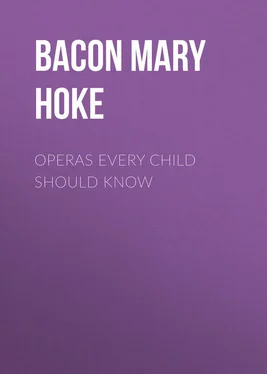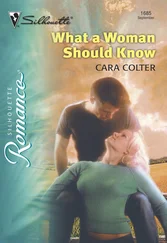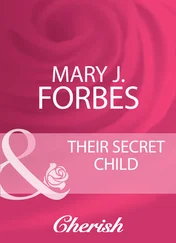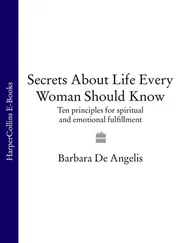Mary Bacon - Operas Every Child Should Know
Здесь есть возможность читать онлайн «Mary Bacon - Operas Every Child Should Know» — ознакомительный отрывок электронной книги совершенно бесплатно, а после прочтения отрывка купить полную версию. В некоторых случаях можно слушать аудио, скачать через торрент в формате fb2 и присутствует краткое содержание. Жанр: foreign_antique, foreign_prose, на английском языке. Описание произведения, (предисловие) а так же отзывы посетителей доступны на портале библиотеки ЛибКат.
- Название:Operas Every Child Should Know
- Автор:
- Жанр:
- Год:неизвестен
- ISBN:нет данных
- Рейтинг книги:4 / 5. Голосов: 1
-
Избранное:Добавить в избранное
- Отзывы:
-
Ваша оценка:
- 80
- 1
- 2
- 3
- 4
- 5
Operas Every Child Should Know: краткое содержание, описание и аннотация
Предлагаем к чтению аннотацию, описание, краткое содержание или предисловие (зависит от того, что написал сам автор книги «Operas Every Child Should Know»). Если вы не нашли необходимую информацию о книге — напишите в комментариях, мы постараемся отыскать её.
Operas Every Child Should Know — читать онлайн ознакомительный отрывок
Ниже представлен текст книги, разбитый по страницам. Система сохранения места последней прочитанной страницы, позволяет с удобством читать онлайн бесплатно книгу «Operas Every Child Should Know», без необходимости каждый раз заново искать на чём Вы остановились. Поставьте закладку, и сможете в любой момент перейти на страницу, на которой закончили чтение.
Интервал:
Закладка:
Mary Schell Hoke Bacon
Operas Every Child Should Know Descriptions of the Text and Music of Some of the Most Famous Masterpieces
FOREWORD
In selecting a few of the operas every child should know, the editor's greatest difficulty is in determining what to leave out. The wish to include "L'Africaine," "Othello," "Lucia," "Don Pasquale," "Mignon," "Nozze di Figaro," "Don Giovanni," "Rienzi," "Tannhäuser," "Romeo and Juliet," "Parsifal," "Freischütz," and a hundred others makes one impatient of limitations.
The operas described here are not all great compositions: Some of them are hopelessly poor. Those of Balfe and Flotow are included because they were expressions of popular taste when our grandfathers enjoyed going to the opera.
The Nibelung Ring is used in preference to several other compositions of Wagner because the four operas included in it are the fullest both of musical and story wonders, and are at the same time the least understood.
"Aïda" and "Carmen" belong here – as do many which are left out – because of their beauty and musical splendour. Few, instead of many, operas have been written about in this book, because it seemed better to give a complete idea of several than a superficial sketch of many.
The beginnings of opera – music-drama – are unknown; but Sulpitius, an Italian, declared that opera was heard in Italy as early as 1490. The Greeks, of course, accompanied their tragedies with music long before that time, but that would not imply "opera" as we understand it. However, modern opera is doubtless merely the development of that manner of presenting drama.
After the opera, came the ballet, and that belonged distinctively to France. Before 1681 there were no women dancers in the ballet – only males. All ballets of shepherdesses and nymphs and dryads were represented by men and boys; but at last, the ladies of the court of France took to the ballet for their own amusement, and thus women dancers became the fashion.
Even the most heroic or touching stories must lose much of their dignity when made into opera, since in that case the "music's the thing," and not the "play." For this reason it has seemed necessary to tell the stories of such operas as "Il Trovatore," with all their bombastic trimmings complete, in order to be faithful in showing them as they really are. On the other hand, it has been necessary to try to treat "Pinafore" in Gilbert's rollicking fashion.
Opera is the most superficial thing in the world, even if it appears the most beautiful to the senses, if not to the intelligence. We go to opera not specially to understand the story, but to hear music and to see beautiful scenic effects. It is necessary, however, to know enough of the story to appreciate the cause of the movement upon the stage, and without some acquaintance of it beforehand one gets but a very imperfect knowledge of an opera story from hearing it once.
A very great deal is said of music-motif and music-illustration, and it has been demonstrated again and again that this is largely the effort of the ultra-artistic to discover what is not there. At best, music is a "concord of sweet sounds" – heroic, tender, exciting, etc.; but the elemental passions and emotions are almost all it can define, or even suggest. Certain music is called "characteristic" – anvil choruses, for example, where hammers or triangles or tin whistles are used, but that is not music in its best estate, and musical purpose is best understood after a composer has labelled it, whether the ultra-artistic are ready to admit it or not.
The opera is never more enjoyed than by a music lover who is incapable of criticism from lack of musical knowledge: music being first and last an emotional art; and as our emotions are refined it requires compositions of a more and more elevated character to appeal to them. Thus, we range from the bathos and vulgarity of the music hall to the glories of grand opera!
The history of opera should be known and composers classified, just as it is desirable to know and to classify authors, painters, sculptors, and actors.
Music is first of all something to be felt, and it is one of the arts which does not always explain itself.
Dolores Bacon.BALFE
THE story of The Bohemian Girl is supposed to have been taken from a French ballet entitled The Gipsy, which was produced in Paris in 1839. Again, it is said to have been stolen from a play written by the Marquis de Saint-Georges, which was named La Bohémienne. However that may be, it would at first sight hardly seem worth stealing, but it has nevertheless been popular for many decades. Balfe, the composer, had no sense of dramatic composition and was not much of a musician, but he had a talent for writing that which could be sung. It was not always beautiful, but it was always practicable.
The original title of La Bohémienne has in its meaning nothing to do with Bohemia, and therefore a literal translation does not seem to have been especially applicable to the opera as Bunn made it. The story is placed in Hungary and not in Bohemia, and the hero came from Warsaw, hence the title is a misnomer all the way around. It was Balfe who tried to establish English opera in London, and to that purpose he wrote an opera or two in which his wife sang the principal rôles; but in the midst of that enterprise he received favourable propositions from Paris, and therefore abandoned the London engagement. When he went to Paris, The Bohemian Girl was only partly written, and he took from its score several of its arias for use in a new opera. When he returned to London he wrote new music for the old opera, and thus The Bohemian Girl knew many vicissitudes off, as well as on, the stage.
The first city to hear this opera, outside of London, was New York. It was produced in America at the Park Theatre, November 25, 1844. The most remarkable thing about that performance was that the part of Arline was sung in the same cast by two women, Miss Dyott and Mrs. Seguin: the former singing it in the first act, the latter in the second and third. When it was produced in London, Piccolomini (a most famous singer) sang Arline and it was written that "applause from the many loud enough to rend the heavens" followed.
Because of this inconsequent opera, Balfe was given the cross of the Legion of Honour from Napoleon III., and was made Commander of the Order of Carlos III. by the regent of Spain. This seems incredible, for good music was perfectly well known from bad, but the undefined element of popularity was there, and thus the opera became a living thing.
A story is told of Balfe while he belonged to the Drury Lane orchestra. "Vauxhall Gardens" were then in vogue, and there was a call for the Drury Lane musicians to go there to play. The "Gardens" were a long way off, and there was no tram-car or other means of transportation for their patrons. Those who hadn't a coach had no way of getting there, and it must have cost Balfe considerable to go and come each day. He decided to find lodgings near the Gardens to save himself expense. He looked and looked, on the day he first went out. Others wanted the same thing, and it was not easy to place himself. However, by evening, he had decided to take anything he could find; so he engaged a room at an unpromising looking house. He was kept waiting by the landlady for a long time in the passageway, but at last he was escorted up to his room, and, being tired out, he immediately went to bed and to sleep. In the morning he began to look about, and to his horror and amazement he found a corpse stowed away in a cupboard. Some member of his landlady's family who occupied the bed had died. When he applied for the room, he had been made to wait while the previous occupant was hastily tucked out of sight. After that, he never hired lodgings without first looking into the cupboards and under the bed.
Читать дальшеИнтервал:
Закладка:
Похожие книги на «Operas Every Child Should Know»
Представляем Вашему вниманию похожие книги на «Operas Every Child Should Know» списком для выбора. Мы отобрали схожую по названию и смыслу литературу в надежде предоставить читателям больше вариантов отыскать новые, интересные, ещё непрочитанные произведения.
Обсуждение, отзывы о книге «Operas Every Child Should Know» и просто собственные мнения читателей. Оставьте ваши комментарии, напишите, что Вы думаете о произведении, его смысле или главных героях. Укажите что конкретно понравилось, а что нет, и почему Вы так считаете.












